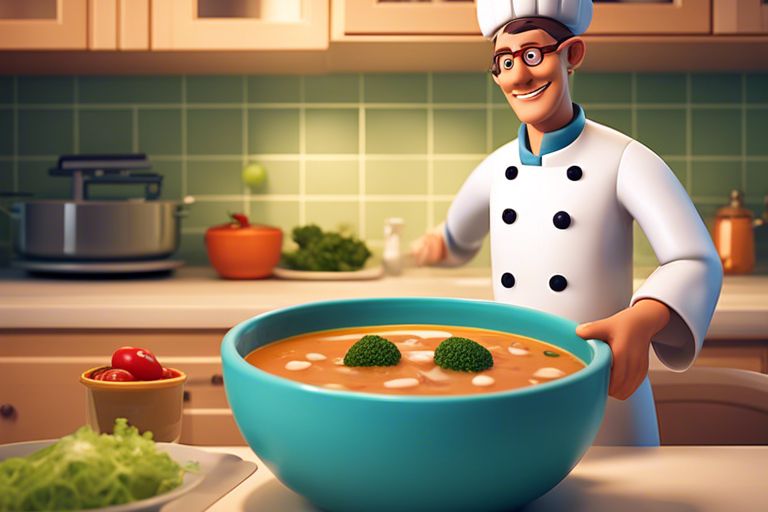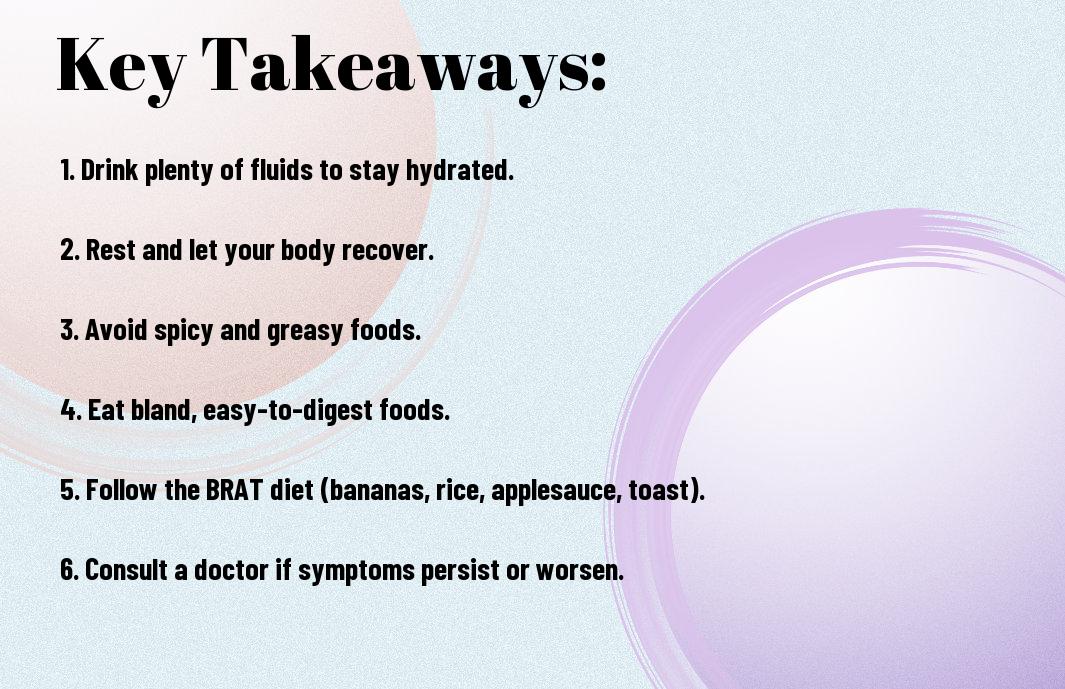There’s nothing more unpleasant than dealing with the effects of food poisoning. However, with the right steps, you can help your body recover faster. From staying hydrated to consuming bland foods, here’s how you can effectively flush out those toxins and get back to feeling your best self again.
Key Takeaways:
- Stay Hydrated: Drink plenty of water to help flush out the toxins from your system and prevent dehydration.
- Rest and Recover: Allow your body to rest and recover by getting enough sleep and avoiding heavy or greasy foods until you feel better.
- Consult a Doctor: If your symptoms persist or worsen, seek medical attention to ensure proper treatment and diagnosis.

Causes of Food Poisoning
While food poisoning can result from various causes, the most common culprits include bacterial contamination, viral infections, and parasitic infestations.
Bacterial Contamination
Bacterial contamination is one of the primary causes of food poisoning. Bacteria such as Salmonella, E. coli, and Campylobacter can contaminate food during handling, preparation, or storage. When these bacteria are ingested, they can multiply in your digestive system and cause symptoms like nausea, vomiting, diarrhea, and abdominal pain.
Viral Infections
Food poisoning can also be caused by viruses like norovirus and rotavirus. These viruses can contaminate food when handled by infected individuals or through contaminated water sources. Symptoms of viral food poisoning usually include nausea, vomiting, diarrhea, and fever.
With viral infections, it’s crucial to practice good hygiene, such as washing your hands thoroughly before handling food and ensuring that food is cooked properly to kill any viruses present.
Parasitic Infestations
An infestation of parasites like Giardia or Cryptosporidium can also lead to food poisoning. These parasites can be present in contaminated food or water sources and cause symptoms like diarrhea, abdominal cramps, and weight loss.
Another common parasite that can cause food poisoning is Trichinella, which is often found in undercooked pork products. It can cause symptoms like muscle pain, swelling, and fever.

Symptoms of Food Poisoning
Mild Symptoms
To begin with, assuming you have mild food poisoning, you may experience symptoms such as nausea, vomiting, diarrhea, stomach cramps, and a mild fever. These symptoms typically appear within a few hours to a few days after consuming contaminated food or beverages. While uncomfortable, mild food poisoning can often be managed at home with rest and plenty of fluids to prevent dehydration.
Severe Symptoms
Food poisoning can also manifest in more severe symptoms, including persistent vomiting, high fever, severe diarrhea, blood in the stool, and signs of dehydration such as dark urine and dizziness. In cases of severe food poisoning, it is crucial to seek medical attention promptly to prevent complications and receive appropriate treatment.
It is important to note that certain groups, such as young children, the elderly, pregnant women, and individuals with weakened immune systems, may be at higher risk of developing severe symptoms of food poisoning. If you fall into one of these categories and experience symptoms of food poisoning, it is even more important to seek medical help promptly.
When to Seek Medical Attention
Mild food poisoning symptoms may resolve on their own within a few days with proper rest and hydration. However, if your symptoms worsen or persist for more than a couple of days, it is advisable to seek medical attention. This is especially important if you belong to a high-risk group or if you are unable to keep any fluids down due to persistent vomiting and diarrhea.
Natural Remedies for Food Poisoning
Hydration Therapy
For hydration therapy, it is imperative to replenish fluids and electrolytes lost due to food poisoning. The best way to do this is by drinking clear fluids like water, herbal teas, or electrolyte-rich drinks such as coconut water. Sipping on these liquids throughout the day can help prevent dehydration and support your body in flushing out toxins.
Rest and Relaxation
Any because the symptoms of food poisoning can leave you feeling weak and fatigued, it is crucial to prioritize rest and relaxation. Give your body the chance to recover by getting plenty of sleep and allowing yourself to rest. Avoid strenuous activities and focus on activities that promote relaxation, such as meditation or gentle stretching exercises.
Additionally, try to avoid consuming solid foods while you are experiencing symptoms of food poisoning. Giving your digestive system a break can help alleviate discomfort and speed up the healing process.
Activated Charcoal
Understanding activated charcoal is known for its ability to absorb toxins in the body, making it a popular remedy for food poisoning. Activated charcoal can bind to harmful substances in the gastrointestinal tract and help eliminate them from your system. You can find activated charcoal in supplement form or as a powder that can be mixed with water.
Probiotics
With probiotics, you can introduce beneficial bacteria back into your gut to help restore balance and support digestion. Probiotic-rich foods like yogurt, kefir, and sauerkraut can help replenish the good bacteria in your gut and aid in recovery from food poisoning. Alternatively, you can also take probiotic supplements to help speed up the healing process.
Medical Treatment for Food Poisoning
To effectively treat food poisoning, medical intervention may be necessary depending on the severity of your symptoms. Here are some common medical treatments that healthcare providers may recommend:
Antibiotics
To address severe cases of food poisoning caused by bacterial infections, your healthcare provider may prescribe antibiotics. Antibiotics can help kill the harmful bacteria in your system, speeding up your recovery process. It is crucial to take the full course of antibiotics as prescribed by your doctor, even if you start feeling better before completing the treatment.
Anti-Diarrheal Medications
On the other hand, if your food poisoning symptoms primarily involve diarrhea, your healthcare provider may recommend anti-diarrheal medications to help alleviate this unpleasant symptom. These medications work by slowing down the movement of your intestines, giving your body a chance to absorb water and nutrients properly. However, it’s important to consult your healthcare provider before taking any over-the-counter anti-diarrheal medications, as they may not be suitable for everyone.
In some cases, anti-diarrheal medications may not be recommended, especially if your body is trying to naturally flush out the harmful bacteria or toxins causing food poisoning. It’s important to follow your healthcare provider’s advice to ensure the most effective treatment for your specific condition.
IV Fluids
Medical professionals may recommend intravenous (IV) fluids for severe cases of food poisoning that result in dehydration. IV fluids help replenish the fluids and electrolytes your body loses through vomiting and diarrhea rapidly. By receiving fluids intravenously, your body can quickly rehydrate, helping you recover more efficiently.
If you are unable to keep fluids down or are experiencing severe dehydration symptoms, such as dizziness or extreme thirst, seek medical help immediately. IV fluids can provide the necessary hydration and electrolytes your body needs to combat food poisoning effectively.
These medical treatments play a crucial role in helping your body fight off food poisoning and recover as quickly as possible. By seeking medical attention and following your healthcare provider’s recommendations, you can effectively eliminate food poisoning from your system and prevent any potential complications.
Home Care for Food Poisoning
Now, when dealing with food poisoning, it is important to take care of your body and help it recover. Home care plays a vital role in your healing process. Here are some steps you can take to alleviate symptoms and support your body as it fights off the toxins.
Restoring Electrolytes
On top of the list is restoring electrolytes in your system. When dealing with food poisoning, you often lose fluids and electrolytes through vomiting and diarrhea. To replenish these vital nutrients, consider drinking oral rehydration solutions or sports drinks that can help restore electrolyte balance in your body, aiding in the recovery process.
Managing Nausea and Vomiting
One of the most common symptoms of food poisoning is nausea and vomiting. To manage these symptoms, you can try sipping on clear fluids like water, ginger tea, or electrolyte solutions. Avoiding solid foods for a few hours can also help calm your stomach. If vomiting persists or is severe, it’s crucial to seek medical attention to prevent dehydration.
With a focus on easy-to-digest foods, a bland diet can help give your sensitive stomach a break while still providing crucial nutrients. Opt for plain foods like toast, crackers, bananas, rice, and boiled potatoes. These foods are gentle on your digestive system and can help ease discomfort while you recover from food poisoning.
Restoring Nutrients with Bland Diet
The key to the bland diet is to choose foods that are low in fat and fiber to give your digestive system a chance to rest. While on this diet, you may want to avoid spicy, greasy, or overly seasoned foods that could irritate your stomach further. Instead, focus on easy-to-digest options that can provide the necessary nutrients without causing additional distress.
The road to recovery from food poisoning may seem challenging, but with the right home care practices, you can help your body heal more efficiently. By focusing on replenishing electrolytes, managing symptoms like nausea and vomiting, and following a bland diet, you can support your body’s natural healing process and get back on your feet sooner. Remember to listen to your body, stay hydrated, and seek medical help if symptoms persist or worsen.
Preventing Future Episodes of Food Poisoning
After experiencing the unpleasant symptoms of food poisoning, you may be wondering how to prevent it from happening again. Educating yourself on safe food handling practices is crucial. For more information on the symptoms and signs of food poisoning, you can refer to the article on Food Poisoning (Foodborne Illness): Symptoms, Signs, …
Safe Food Handling Practices
One of the most effective ways to prevent food poisoning is to practice safe food handling. This includes washing your hands before and after handling food, properly washing fruits and vegetables, cooking meat to the correct internal temperature, and refrigerating leftovers promptly.
Avoiding High-Risk Foods
Handling high-risk foods such as raw eggs, undercooked meats, unpasteurized dairy products, and raw seafood with caution is important in preventing food poisoning. It is important to store and prepare these foods separately from other items to avoid cross-contamination.
It is also advisable to steer clear of foods that are past their expiration date or have been stored improperly. When dining out, choose reputable eateries with high food safety standards to lower the risk of foodborne illnesses.
Boosting Immunity
Any efforts to boost your immune system can also contribute to preventing food poisoning. Consuming a balanced diet rich in fruits, vegetables, and whole grains provides your body with important nutrients to strengthen your immune response. Additionally, staying hydrated, getting regular exercise, and managing stress can all help support a healthy immune system.
Food poisoning can be a challenging and uncomfortable experience, but by following these preventative measures, you can significantly reduce your risk of future episodes. Be mindful of, taking proactive steps in safe food handling, avoiding high-risk foods, and boosting your immunity are key factors in protecting yourself from foodborne illnesses.

To wrap up
To rid your system of food poisoning, remember to stay hydrated, rest, and avoid consuming solid foods until your symptoms improve. Be sure to consult a healthcare provider if your symptoms persist or worsen, as they can provide guidance on treatment options or further evaluation if needed. By following these steps and taking care of yourself, you can help your body recover from food poisoning and get back to feeling better sooner.
FAQ
Q: What are the symptoms of food poisoning?
A: The symptoms of food poisoning can vary but commonly include nausea, vomiting, diarrhea, stomach cramps, and fever.
Q: How long does it take to recover from food poisoning?
A: The recovery time from food poisoning depends on the type of bacteria or virus that caused it. In most cases, people recover within a few days to a week.
Q: How can you get food poisoning out of your system?
A: To get food poisoning out of your system, it is imperative to stay hydrated, rest, and avoid solid foods for a period to allow your digestive system to recover. Gradually introduce bland and easy-to-digest foods like toast, rice, and bananas. If symptoms persist or worsen, seek medical attention.
